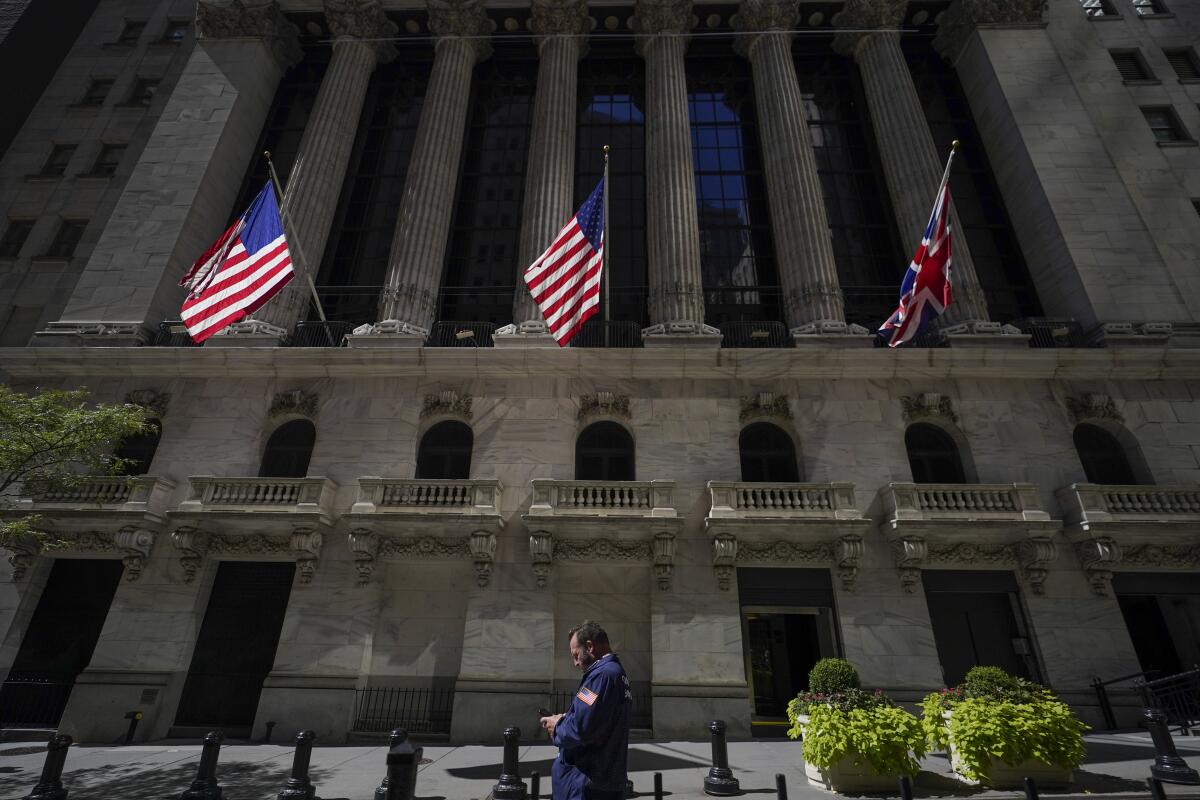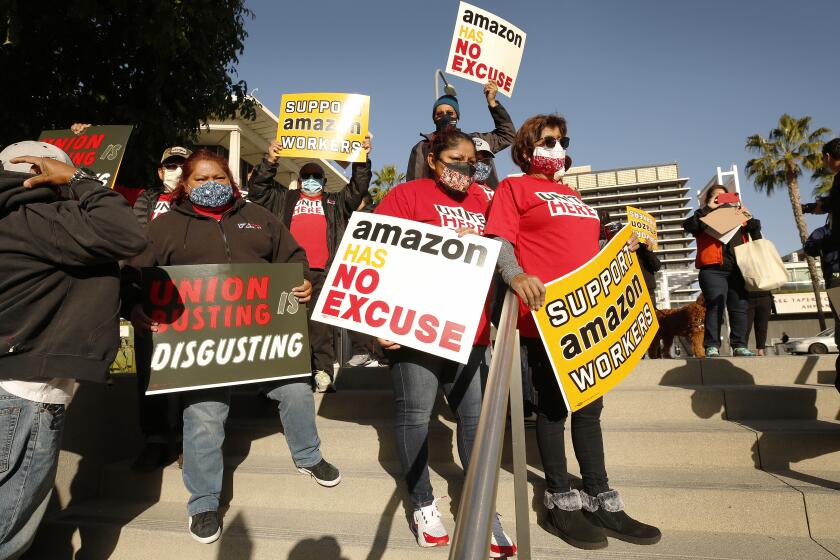Stocks sink as markets brace for big week with Fed, earnings

- Share via
Stocks sank Monday as Wall Street prepped for a week full of potentially market-moving events, including decisions on interest rates around the world and earnings reports from the biggest U.S. companies.
The Standard & Poor’s 500 index dropped 1.3%, giving back some of the gains that had carried it last week to its highest level since early December. The Dow Jones industrial average fell 0.8%, while the Nasdaq composite sank 2%.
Markets have been veering recently on worries that the economy and corporate profits may be set for a steep drop-off, along with competing hopes that cooling inflation will get the Federal Reserve to take it easier on interest rates.
The central bank’s next decision on rates is coming Wednesday, and most investors expect it to announce an increase of just 0.25 percentage points. That would be the smallest increase in nearly a year, following a spate of hikes of 0.75 points and then a 0.50-point increase, and it would mean less added pressure on the economy.
Higher rates combat inflation by intentionally slowing the economy, while also being a drag on prices for investments. Inflation has been cooling since the summer amid last year’s blizzard of rate hikes, but the economy has also been showing signs of concern.
The state can’t continue to rely on the tax revenues generated by tech, media and ever-rising property prices. But there are ways to turn painful realities to California’s advantage.
The big question is whether Fed Chair Jerome H. Powell afterward will give markets what they want to hear — hints that rate hikes will end soon and rate cuts may even be possible late this year — or stick to the Fed’s mantra that it plans to keep rates higher for longer, even if a modest recession hits.
“I think that they have no intention of cutting rates this year,” said Sam Stovall, chief investment strategist at CFRA Research, adding that the Fed waits an average of roughly nine months after its last rate hike before cutting.
“They’ll reiterate that they don’t want to make the mistakes of the 1970s,” he said, “but I think in the back of their minds, they’re going to say no matter which inflationary indicator you look at, they’re all heading in a stair-step downward pattern.”
Central banks for Europe and for the United Kingdom are also set to announce their latest decisions on rate increases this week.
Beyond interest rates, more than 100 companies in the S&P 500 are scheduled this week to report results for the last three months of 2022. Among them are tech heavyweights Apple, Amazon and Google’s parent company, Alphabet. Because these companies are three of the four biggest on Wall Street by market value, their stock movements hold much more sway on the S&P 500 than others’.
Apple’s 2% drop Monday, for example, was the heaviest weight on the S&P 500.
The only other company that rivals them in size, Microsoft, shook Wall Street last week when it gave forecasts that raised worries about a slowdown in corporate spending on tech. Its stock fell 2.2% on Monday.
All told, the S&P 500 fell 52.79 points to 4,017.77. The Dow lost 260.99 points to close at 33,717.09, and the Nasdaq dropped 227.90 points to 11,393.81.
Strategists at Morgan Stanley led by Michael Wilson warn that tougher times may be ahead.
“The reality is that earnings are proving to be even worse than feared based on the data, especially as it relates to margins,” they wrote in a report. “Secondly, investors seem to have forgotten the cardinal rule of ‘Don’t Fight the Fed’. Perhaps this week will serve as a reminder.”
Wildly profitable tech companies are citing an as-yet notional recession to make deep workforce cuts. They may have another agenda.
Later this week, the U.S. government will also give its latest monthly update on the job market. Hiring has remained remarkably resilient across the broad economy, even as housing and other corners weaken sharply under the weight of all the Fed’s rate hikes from last year.
Some big tech companies have announced high-profile layoffs after acknowledging that they misread their boom coming out of the pandemic. But job cuts may be starting to spread to other areas of the economy. Hasbro and 3M last week announced layoffs.
All told, economists expect Friday’s report to show that U.S. employers added 187,500 more jobs than they cut during January. That would be a slowdown from December’s net hiring of 223,000.
The yield on the 10-year Treasury rose to 3.53% from 3.51% late Friday. The two-year yield, which tends to move more on expectations of Fed actions, rose to 4.25% from 4.20%.
AP business writers Damian J. Troise, Elaine Kurtenbach and Matt Ott contributed to this report.
More to Read
Inside the business of entertainment
The Wide Shot brings you news, analysis and insights on everything from streaming wars to production — and what it all means for the future.
You may occasionally receive promotional content from the Los Angeles Times.












